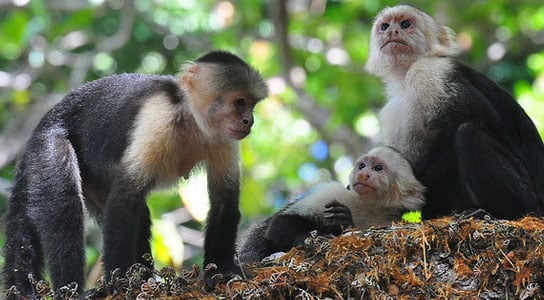Members of Small Monkey Groups Are More Likely to Fight
December 29, 2011

Who wins when small monkey groups have territorial disputes with larger groups? The answer is small monkey groups. Smaller groups may be more likely to win because some members of the larger groups avoid aggressive confrontations. A new report shows that individual monkeys that don’t participate in conflicts prevent large groups from overrunning the smaller groups.
The authors of the report used recorded vocalizations to simulate territorial invasions into the ranges of wild white-faced capuchin monkey groups at the Smithsonian research station on Barro Colorado Island in Panama. The monkeys responded more enthusiastically to territorial challenges near the center of their territories and were more likely to flee in encounters that take place near the borders.
Defection (running away) by members of larger groups was more common than defection by members of smaller groups. Groups that outnumbered their opponents could convert their numbers to a competitive advantage when defending the center of their own range against neighboring intruders, but failed to do so when they attempted to invade the ranges of their neighbors, because more individuals in large groups chose not to participate. They aren’t sure why this is. Perhaps they just aren’t that interested when their home is not at stake.
In short, it is these behaviors that create a balance of power that could be considered a “home-field advantage.” This explains how large and small groups are able to coexist, without larger groups dominating.
No comments:
Post a Comment